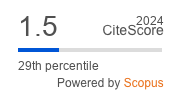Working in the COVID-19 pandemic: an observational study
DOI:
https://doi.org/10.5753/jis.2021.2178Keywords:
adaptation, remote work, pandemicAbstract
The restrictions of social isolation adopted to contain the spread of the COVID-19 pandemic have led many companies to adopt remote work in a mandatory and unplanned way. This sudden transition has caused profound changes in personal and professional relationships. In this article, we present the results of a qualitative observational study on the adaptations made in the activities of the software development process of two companies. These adaptations were intended to support the transition to teleworking during the pandemic. They were analyzed based on the theoretical framework of Olson and Olson for distributed collaboration. Software developers’ motivations and observed challenges are also presented. Based on these results, the article presents recommendations to facilitate the adaptation to remote work in software development teams.
Downloads
References
Agile Manifesto. Disponível em http://agilemani-festo.org/. Acesso em 10 de janeiro de 2021.
Aguiar, F.; Caroli, P. Product Backlog Building: Concepção de um Product Backlog efetivo. 1ª edição. São Paulo, Editora Caroli, 2021.
Bao, L.; et al. How dows Working from Home Affect Developer Productivity? A Case Study of Baidu During COVID-19 Pandemic. 2020. doi: https://arxiv.org/abs/2005.13167
Bjørn, P.; et al. Does Distance Still Matter? Revisiting the CSCW fundamentals on Distributed Collaboration. ACM TOCHI 21, 5 (2014), 1-26.
Caldeira, C.; et al.Remote workers’ wellbeing in the age of COVID-19. In Proceedings of the 17th Brazilian Symposium on Collaborative Systems, pp. 117-124, 2021.
Caroli, P. Lean Inception: Como alinhar pessoas e construir o produto certo. 1ª edição. São Paulo, Editora Caroli, 2018.
Cramton, C. D. (2001), “The mutual knowledge problem and its consequences for dispersed collaboration”, Organization Science, Vol. 12, pp. 346-371.
Dourish, Paul & Bellotti, Victoria. (1992). “Awareness and Coordination in Shared Workspaces”. Proceedings of the Conference on Computer-Supported Cooperative Work. 10.1145/143457.143468.
Fino, C.M.N., (2003). FAQs, etnografia e observação participante. Revista europeia de etnografia da educação,v3, pp.95-105.
Ford, D.; Storey, M.; A Tale of Two Cities: Software Developers Working from Home During the COVID-19 Pandemic. 2020. doi: arxiv.org/abs/2008.11147
GitLab. The remote playbook from the largest all-remote Company in the world. (2020). Acesso em https://about.gitlab.com/resources/downloads/ebook-remote-playbook.pdf.
Jolak, R., Wortmann, A., Chaudron, M. and Rumpe, B. “Does Distance Still Matter? Revisiting Collaborative Distributed Software Design”, in IEEE Software, vol. 35, no. 6, pp. 40-47, November/December 2018.
Machado, L.; Gendered experiences of software engineers during the COVID-19 crisis. In IEEE Software, 2020. doi: 10.1109/MS.2020.3040135
Miller, C. et al. How Was Your Weekend? Software Development Teams Working from Home During COVID-19. In IEEE/ACM 43rd International Conference on Software Engineering (ICSE), pp. 624-636, 2021.
Monteiro, L. T. and Oliveira, S. R. B. An Improvement on the Agile Process of COTIC-PROEG from UFPA to Attend MR-MPS-SW Process of Requirements Development. In: 16th International Conference on Information System & Technology Management, 2019.
OliveiraJr, E.; et al. Surveying the impacts of COVID-19 on the perceived productivity of Brazilian software developers. In Brazilian Symposiumon Software Engineering, 2020.
Olson, G. M. and Olson, J. S. Distance Matters. Human-Computer Interaction 15, 2-3 (2000), 139-178.
Olson, J. S.; Hofer, E.; et al. (2008). A theory of remote scientific collaboration. Scientific collaboration on the internet, pp. 73-97.
Olson, J. and Olson, G. (2014), “How to make distance work work”. Interactions 21, 2 (March + April 2014), 28–35. doi: https://doi.org/10.1145/2567788
Ralph, P.; Baltes, S.; Adisaputri, G. et al. Pandemic Programming. Empirical Software Engineering 25, 6 (2020), 4927-4961.
Russo, D. et al. The Daily Life of Software Engineers During the COVID-19 Pandemic. In IEEE/ACM 43rd International Conference on Software Engineering: Software Engineering in Practice (ICSE-SEIP), pp. 364-373, 2021.
Schwaber, K.and SutherlandJ. (2020) “O guia do Scrum. O guia definitivo para o Scrum: as regras do jogo”. https://www.scrumguides.org/docs/scrum-guide/v2020/2020-Scrum-Guide-PortugueseBR-2.0.pdf, July.
Watson-Manheim, M. B., & Bélanger, F. (2002). Support for communication-based work processes in virtual work. E-Service, 1(3), 61-82.
Whillans, A. et al (2021). Experimenting during the shift to virtual teamwork: Learnings from how teams adapted their activities during the COVID-19 pandemic. In Information and Organization. vol 31 (1), 100343, 2021.
Yang, L.; et al (2021). The effects of remote work on collaboration among information workers. In Nature Human Behaviour, 2021. doi: 10.1038/s41562-021-01196-4.
Downloads
Published
How to Cite
Issue
Section
License
Copyright (c) 2021 Diego Lisbôa, Thayssa da Rocha, Letícia Machado, Clara Caldeira, Cleidson de Souza

This work is licensed under a Creative Commons Attribution 4.0 International License.
JIS is free of charge for authors and readers, and all papers published by JIS follow the Creative Commons Attribution 4.0 International (CC BY 4.0) license.








